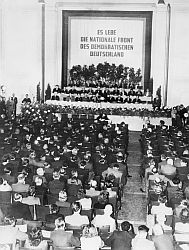1949-89: Volkskammer of the GDR (East-Germany)

7 October 1949: Founding of the German Democratic Republic
© dpa
1949: Founding of the GDR
The preparations for the founding of the German Democratic Republic (GDR) began in 1949. The 2nd People’s Congress convened by the Socialist Unity Party of Germany (SED) elected a "People’s Council" - which was also controlled by the SED. The People’s Council presented a draft constitution, Article 6 of which provided for the criminal prosecution of any kind of "agitation against democratic institutions and organisations" and therefore came to be an instrument of political persecution.
The elections to the 3rd People’s Congress were held in May 1949. In these elections, the parties that had been founded in the Soviet Zone of Occupation were no longer able to compete against each other, but only put forward candidates on a single list - combined in a block known as the “National Front”. The distribution of seats was determined from the beginning, regardless of the election results.
The GDR was founded on 7 October 1949 when the German People’s Council constituted itself as the "Provisional Volkskammer". One year later, the first elections to the Volkskammer (People’s Chamber) were held.
Volkskammer elections - neither free nor secret
Although the first Constitution of the GDR, in particular, gives the impression that the German Democratic Republic was designed as a parliamentary democracy similar to the Weimar Republic, this similarity existed only on paper.
The Constitution was no more than a façade that concealed where power really lay. In reality, the elections were anything but free because there was only a single list of candidates. And they were not secret because it was increasingly regarded as the citizen’s duty to cast their vote openly. Using a voting booth, rejecting the official list or not voting at all could result in career problems and other disadvantages.
The first elections to the Volkskammer set a pattern that was to continue throughout the GDR era. The distribution of seats between the parties and organisations combined in the National Front and controlled by the SED in the Volkskammer had been determined before the voting even started.
Parliament without power
The Volkskammer could not be called an independent parliament. Debates in which items or events could be discussed from different points of view were not possible, either in the plenary or in the committees. And it was certainly not the job of the Volkskammer to scrutinise the work of the government.
This is why the designation of the Volkskammer as the supreme organ of power was misleading. The Volkskammer had no power of its own. Instead, power was concentrated in the leading organs of the SED. And there was no chance of an opposition being permitted.
Since it could only rubber stamp the decisions reached by the party and state leadership, the Volkskammer generally needed to meet no more than two or three times a year to unanimously adopt the laws formulated by the Council of Ministers, the Council of State or the specialised policy departments of the Central Committee of the SED.
1989/90: First free Volkskammer elections
The Volkskammer only became a real parliament with the peaceful revolution of 1989. Mass demonstrations were held at which calls were made for free elections to the Volkskammer that would express the will of the people. The Round Table formed with representatives of the old parties, the newly founded Social Democratic Party of the GDR (SDP) and opposition civil rights groups took up these demands and urged the new Modrow government (Socialist Unity Party of Germany/Party of Democratic Socialism, SED/PDS) to embrace constitutional change and set a date for elections.
The first and only free parliamentary elections in the GDR were held on 18 March 1990 with a turnout of 93.4 percent. The CDU-led Alliance for Germany won with just over 48 percent of the vote.
In its constituent sitting on 5 April, the Volkskammer elected Sabine Bergmann-Pohl (CDU) as its President. Lothar de Maizière (CDU) became Prime Minister and formed a grand coalition consisting of the CDU, the SDP, the FDP, the German Social Union (DSU) and one non-attached member.
